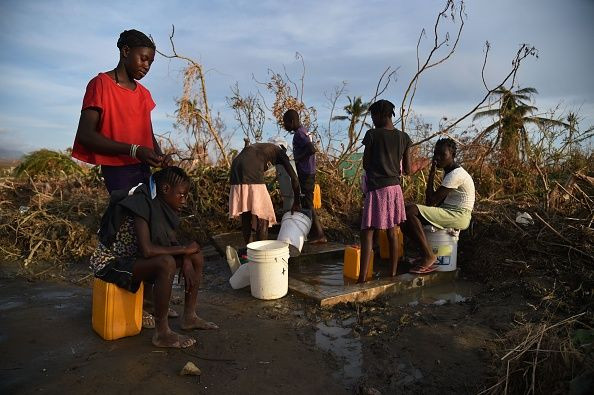Cholera In Haiti On The Rise After Hurricane Matthew; What To Know About Relief Efforts

Last week, Haiti was devastated by Hurricane Matthew, which killed at least 1,000 people and left many more homeless. Now, the Caribbean nation has a new threat, a cholera outbreak spurred by the recent natural disaster. According to Christian Aid, the situation in Haiti is now critical, but unfortunately, disease outbreaks such as these are extremely common after natural disasters.
On Sunday morning there were 39 cases of cholera at the country's Port-a-Piment hospital, and by early afternoon, there were nearly 60, and four people had died of the disease, Sky News reported. Health experts expect this number to continue to rise as the serious flooding and water shortages brought on by the hurricane have drastically increased the transmission of this water-borne illness.
According to the World Health Organization, the association of water-borne illnesses and natural disasters is well known. Cholera is an intestinal infection caused by the bacteria Vibrio cholerae. It spreads through water, usually when the feces of an individual infected with cholera contaminate a water system. For this reason, it is common in areas with inadequate water treatment, poor sanitation, and inadequate hygiene — all of which are common in Haiti. The hurricane has not only caused flooding, which increased the likeliness that an individual would come in contact with contaminated water, but it also cut off water sources, meaning that some people have no choice but to drink and bathe in contaminated water.
According to the Centers for Disease control and Prevention, cholera infections can range from mild to severe, and the bacteria causes diarrhea, vomiting, and rapid dehydration. Without treatment, death can occur quickly.
While epidemics are known to occur after natural disasters, according to a 2007 study on the subject, the risk factors for disease following disaster are more highly influenced by factors such as the availability of safe water and sanitation facilities, the degree of crowding, the underlying health status of the population, and the availability of healthcare services. For this reason, these outbreaks are far more common in poor, less industrialized areas.
According to eyewitness reports in Haiti, bodies can been seen floating down the river, and many survivors are currently without food, water, and shelter, Sky News reported. For now, the country is relying on foreign aid support to help them pull through this devastating situation. The country is in need of help, but news reports warn that if you are to donate, its best to send money to "Haitan-led" organizations, rather than foreign aid groups, such as The Red Cross, The Washington Post reported. Local organizations are better able to mobilize quickly and more effectively than foreign aid groups. However, Gail McGovern, president and CEO of the American Red Cross, published a piece on The Huffington Post, arguing that it's misleading to say the Red Cross does not use its fundraising to help foreign disaster victims, and such information could possibly even hurt relief efforts.
Read More:
Cholera Spreads From Iraq To Syria, Kuwait, Bahrain: UNICEF: Read Here
A Cheap New Cholera Vaccine Has Been Proven Effective in Bangladesh: Read Here
Published by Medicaldaily.com



























